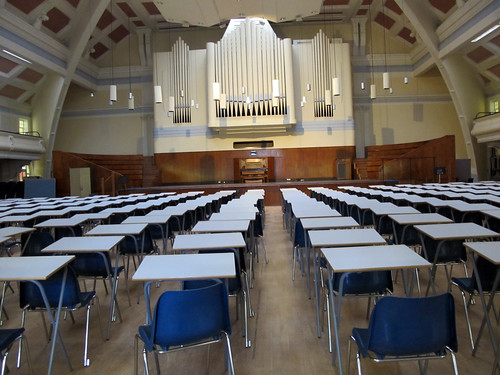Traditions are so hard to break and one of the most entrenched is the proctored written examination. Writing for hours in a silent hall with only your memory to help you has been a rite of passage for generations of students all over the world; my own student years were dominated by these stressful events. The exam halls have been empty for over a year now but the problem of how to examine large groups of students online has lead to much stress and debate. Many have questioned the value of high-stakes summative examination; what valuable career skills are we actually testing in the exam hall? The problem is finding an alternative that will work with large student cohorts and can minimise the risk of cheating.
Interest is growing in more authentic assessment methods such as projects, case studies and portfolios, but these all involve major shifts in course design and teaching practice. Teachers who have always used proctored exams need training and time to reorganise their courses around alternative assessment methods and students will also need to be convinced of the benefits. In a recent article, a teacher here in Sweden described how he carries out one-to-one interviews with all students as an examination method, even with classes of over 200 (read article in Swedish). Each interview takes 15-20 minutes and if that seems like a lot he claimed that correcting written papers took roughly the same time per student. An interview is more personal and makes cheating extremely difficult and an experienced teacher gets a good picture of the student's ability in that time.
This however is an exceptional option and most teachers have chosen solutions that try to emulate the exam hall. A common makeshift solution is where all students log into Zoom and are then monitored via their webcams and microphones. There are plenty of digital examination tools that will lock down the student's computer for the duration of the exam but the most controversial solution has been to use the remote proctoring solutions offered by companies like Proctorio, ProctorU and ExamSoft. These solutions involve remote monitoring of students, AI analysis of facial expressions, keystrokes, mouse clicks and registration of any suspicious activities in the student's room (someone entering the room). The integrity and privacy issues of this kind of surveillance and the question of what the companies do with all that data has been well covered in the past year.
However, it is tempting for a university to opt into remote proctoring since it fits in so well with traditional examination. Remote proctoring allows teachers to continue using their summative examinations and the alternatives all seem to demand extra work and retraining, something most already over-worked teachers will object to. A good example of an institution that was brave enough to avoid remote proctoring and help teachers make the transition to authentic examination is described in an article by a group from the University of Michigan–Dearborn, What Happens When You Close the Door on Remote Proctoring? Moving Toward Authentic Assessments with a People-Centered Approach. Despite pressure to implement remote proctoring they decided to focus on changing their approach to assessment and examination by supporting teachers in their transition. The article explains their rationale for this move and describes the support process that included weekly practical workshops to work through new methods. To lessen the teachers' workload they hired a numbered of specially trained graders to help with the more time-consuming assessment of the new examination methods. The initiative is not complete and they have not completed a transition to authentic assessment but the new approach is gaining acceptance. In conclusion they offer the following advice.
In our experience, leaders such as educational developers, instructional designers, academic technologists, department chairs, and deans will need to be prepared to extensively support faculty during the transition. Many instructors have been using proctored exams for their entire careers and see them as essential to the teaching and learning process. Even as teaching and learning professionals may be eager to see instructors drop high-stakes exams all together, it is important to recognize that changing a long-held teaching practice can feel destabilizing and will likely bring some unforeseen challenges and resistance from instructors (Smith, 2020). Monetary resources saved from the refusal of remote proctoring services can be redirected to invest in ongoing faculty development on assessment and other teaching-related topics. We believe our investment in people, rather than remote proctoring services, will be more robust to the inevitable changes in learning formats and technology that are to come.

No comments:
Post a Comment
Note: Only a member of this blog may post a comment.